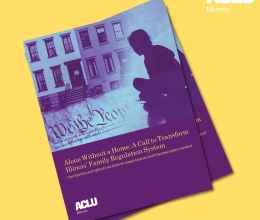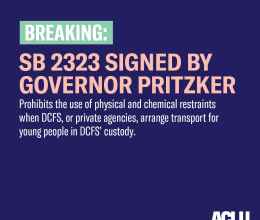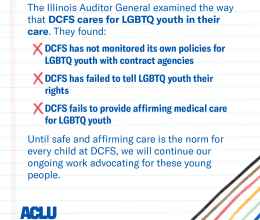
Oral Testimony of Heidi Dalenberg, B.H. v. Walker Class Counsel
Before the Senate Human Services Committee Subject Matter: DCFS Youth Transition into YouthCare, October 21, 2020
My name is Heidi Dalenberg, and I am the Director of the Institutional Reform Project at the ACLU of Illinois.
Chairperson Morrison, Minority Spokesperson Syverson and honorable members of this Committee, thank you for the opportunity to speak with you today. I am here in my role as attorney enforcing the B.H. Consent Decree, representing the children in the custody and care of the Department of Children and Family Services. Our work on behalf of these children includes assuring that the State of Illinois lives up to its obligations to make sure foster children get the medical, psychiatric, and other health care they need, in a timely fashion –when they need it. That issue is front and center today as this Committee addresses the issue of how DCFS youth are faring under the managed care program YouthCare is now running for DCFS youth.
Let me be clear: Many of Illinois’ foster children, are not receiving the care that they need when they need it. That was true before the rollout of the YouthCare plan; it remains true today. We are already seeing clear evidence of this in alarming cases involving children with significant mental health issues. These children are suffering stark and tragic consequences because access to mental health services have not been solved by YouthCare and its network of doctors.
Consider the plight of one fifteen-year-old child in Illinois. In the midst of a mental health crisis, the child was taken to a hospital Emergency Room. Every medical professional agreed the child needed to go to a psychiatric hospital. But the transfer didn’t happen that day, or the next, or even the day after that. You see, DCFS and YouthCare could not find a hospital that would take her. After ten days stuck in an Emergency Room, the doctors decided that this untreated teen was stable enough to leave. Less than a week later, she ran away from her placement.
The situation I just described is horrendous. And it would be unacceptable even if this teen’s case was a single, unique incident under the new YouthCare plan. But there wasn’t just one case following this pattern. There were at least ten foster children in just the last few weeks who were taken to the ER in the midst of a psychiatric crisis, were left in the ER for 4 days, 5 days, or even longer while YouthCare and DCFS searched for a hospital who would take care of them. Each of these children ended up back in their foster homes or care facility without ever being hospitalized or receiving the treatment that everyone agreed was needed.
This is wrong. The children we are talking about are in the hands of the State of Illinois, and while in the State’s care they have suffered untreated mental health crises that predictably will lead to worse symptoms and worse outcomes.
Let me say again that YouthCare did not create these problems. But YouthCare and DCFS should have been prepared to handle these completely predictable crisis situations for foster care children on the very first day of the YouthCare plan. This problem must be fixed, and soon.
So where do we go from here? How do we start improving things within the YouthCare system now that Illinois has gone ahead with that plan?
First – TRACKING OF UNMET NEED.
The members of this Committee, the ACLU of Illinois in our role as Class Counsel for the foster children, the Cook County Public Guardian, and many other child advocates have been asking DCFS to identify the health care services that Illinois’ foster children need but can’t access. DCFS either could not or would not deliver such data. Now is the time for that to change. We must make sure that both DCFS and YouthCare are tracking situations where a child needs something specific – a psychiatrist, or pediatrician, or therapist, or counsellor, or another professional – and YouthCare doesn’t have a provider to treat the child. We can only learn what YouthCare and the State of Illinois have to build if we know what children should have been given. YouthCare has extensive data reporting and data gathering responsibilities under its MCO contract. We urge the members of this Committee explore with HFS how foster children’s unmet needs will be identified and then addressed by YouthCare through the reporting already available to the State.
Second – ENFORCE YOUTHCARE’S OBLIGATIONS TO FILL SERVICE GAPS
Another area this Committee should explore is how HFS is monitoring whether YouthCare is delivering on its promise to develop healthcare resources in places where there are service gaps or “deserts.” When gaps are identified, YouthCare is supposed to prepare a plan for fixing them, and HFS is responsible for monitoring YouthCare’s progress. This Committee is perfectly positioned to oversee that process and ensure accountability.
Third – DCFS MUST LEARN TO USE YOUTHCARE EFFECTIVELY
Based on our involvement in this work, it is clear to us that DCFS is not yet using YouthCare’s services to full advantage. We and the Court-appointed experts in the B.H. suit have been working hard to assist the Department along that learning curve, but the Department has a long way to go. Let me give you just a few concrete examples.
Everyone on this Committee is familiar with DCFS youth who remain hospitalized beyond medical necessity. Right now there are approximately 30 foster youth in psychiatric hospitals— including many who are BMN. On the very first day that the YouthCare Plan went live, DCFS and YouthCare should have been ready for YouthCare to start discharge planning for every one of those hospitalized youth. That did not happen because DCFS and YouthCare insisted on proceeding with the plan rollout as soon as they thought they could get through it without a major disaster -- YouthCare hadn’t even finished pre-screening all DCFS youth to see what sort of care coordination they would need. So we had to prod the Department to get YouthCare working on discharge planning, and that work is now underway. It won’t be an immediate solution for every child, but it’s a start, and YouthCare is supposed to have expertise in finding wrap and support services that youth will need post-hospitalization. Going forward, DCFS and YouthCare should be able to report on whether YouthCare’s services are helping DCFS youth exit psychiatric hospitals when they are ready and with the services they need to keep them safe and stable.
Everyone on this Committee is also familiar with Family First, which is changing how federal funds will be made available for children in congregate care. For Illinois to maximize access to those federal funds, DCFS must make it a top priority to identify children who could leave residential care if they had the support and treatment services those caregivers would need for that living arrangement to be safe. We asked and were told YouthCare wasn’t required to do pre- work on this before the rollout. But DCFS and YouthCare weren’t ready to start that work on September 1 either. Again, no work was started until we asked again in early September for DCFS to give YouthCare a list of youth in residential settings and to identify the services and supports they’ll need before they can move back to a family. This is another area where this Committee can exercise an oversight role, as DCFS and YouthCare should be able to provide reporting about how many children YouthCare was asked to evaluate, whether YouthCare was able to secure the services children needed, and where YouthCare ran into service gaps that need to be fixed.
Another situation where DCFS initially wasn’t demanding services that youth were entitled to have involved children that have come into DCFS care after September 1. Some of those children have significant health issues upon entering care, in the ordinary course, it can take weeks before YouthCare assigns a coordinator to help set up appointments and care for these children. We alerted DCFS that it has the right to demand early assignment of a care coordinator in these situations, and we understand DCFS has started making these requests as the need arises.
Fourth – YOUTHCARE MUST IMPROVE BASIC SERVICE FUNCTIONS
Long before the rollout, the Cook County Public Guardian was sounding the alarm about problems with the website that foster parents are supposed to use when they are looking for a pediatrician, or dentist, or other provider for their child. The website lists were full of errors – telephone numbers that were disconnected, doctors who weren’t at the location listed, and doctors who insisted they were not part of YouthCare’s network while YouthCare insisted the opposite. YouthCare said it would “educate” its providers through a webinar, but did not make that training mandatory. And YouthCare also said it would clean up its website listings to fix errors that were identified in the “secret shopper” calls that the Cook County Public Guardian performed. Far more must be done.
Starting in mid-September, after the YouthCare plan had been operating for about two weeks, the ACLU of Illinois did our own secret shopper exercise. We made calls to pediatrician offices in Belleville, in Peoria, and in Harvey that were listed as part of the YouthCare network and that were shown as “open,” meaning that they would take new patients. We’ve shared the details of our calls with DCFS. But the headline is that the results are poor. In a nutshell, we found that the ability to secure an appointment with a doctor on the first call to the office was approximately 3 in ten. Here are just some examples of what we found:
- Phone numbers were out of service.
- Doctor offices had closed.
- Doctor’s practice specialty was wrong (e.g., a gynecologist listed as a pediatrician).
- Offices said they had never heard of YouthCare (and made us spell it for them).
- Offices initially said – wrongly – that they did not take YouthCare.
- Offices said they would not take new patients until the COVID pandemic was ended.
- Offices said they would not schedule an appointment for a child without first receiving the child’scomplete medical history (documentation that foster parents rarely have, particularly for children new to DCFS care).
YouthCare previously said that if a foster parent runs into roadblocks like these, they should use a “script” posted on the YouthCare website to question the doctor’s office, and if that doesn’t work, they can always call YouthCare for help. You heard that right – parents have to follow a script to convince YouthCare’s network doctors that they are in YouthCare’s network.
The level of deflection tactics that we experienced in the calls we made apparently is acceptable to YouthCare, but HFS, DCFS, and this Committee should not stand for it. YouthCare must be held responsible for doing whatever it takes, at its own expense, to ensure that the doctors in its network know they are “in network” and are truthful about that when foster parents call. Likewise, DCFS and HFS must meet their responsibility to hold YouthCare to the promises it made in its contract with Illinois to ensure DCFS children get the healthcare they need.
We remain committed to working with DCFS and everyone else concerned as this process continues, and we believe your continued, diligent legislative oversight of the Department is critical to addressing systemic, long-standing problems within the Department and to ensuring sustainable reform.


